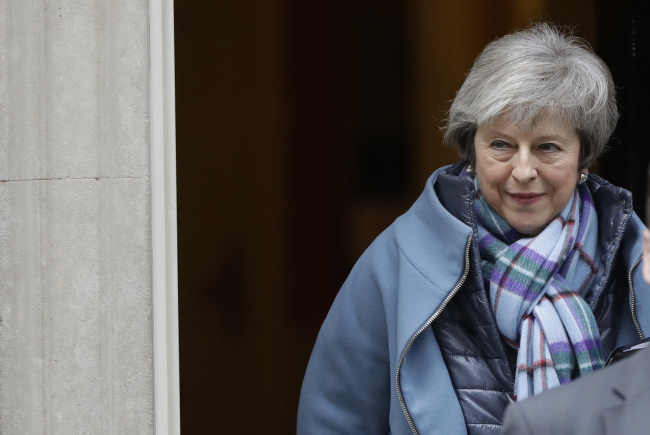
Britain's Prime Minister Theresa May leaves Downing Street after a cabinet meeting at in London, Tuesday, Jan. 29, 2019. (Photo: AP)
British Prime Minister Theresa May said Tuesday she plans to ask the European Union to change the Brexit divorce deal by altering an Irish border guarantee that is opposed by many British lawmakers.
EU leaders have ruled out any renegotiation, but May urged Parliament to give her a mandate by backing a call for the border measure to be replaced by unspecified "alternative arrangements."
"Today we have the chance to show the European Union what it will take to get a deal through this House of Commons; what it will take to move beyond the confusion and division and uncertainty that hangs over us," May told lawmakers in the House of Commons.
British legislators are voting Tuesday on competing Brexit proposals that have been submitted by both pro-Brexit and pro-EU legislators since Parliament rejected May's divorce deal with the bloc two weeks ago, leaving Britain lurching toward a cliff-edge "no-deal" departure on March 29.
Speaker of the House of Commons John Bercow selected seven proposals for debate and vote, including the border change supported by May and several measures that seek to rule out a "no-deal" Brexit.
But amid political gridlock in London and with Brexit day just two months away, the EU shows few, if any, signs of renegotiating the divorce deal it struck with May late last year.
May insists her agreement can still win Parliament's backing, if it is tweaked to alleviate concerns about the border measure, known as the backstop. The backstop would keep the U.K. in a customs union with the EU in order to remove the need for checks along the frontier between the U.K.'s Northern Ireland and EU member Ireland after Britain leaves the bloc.
Opposition to the backstop by pro-Brexit lawmakers — who fear it will trap Britain in regulatory lockstep with the EU — helped sink May's deal on Jan. 15, when Parliament rejected it by 432 votes to 202.
May backed a proposal from a Conservative backbencher calling for the backstop to be replaced by "alternative arrangements," and called on all lawmakers from her Conservative Party to support it.
May said it was a chance to "tell Brussels that the current nature of the backstop is the key reason Parliament cannot support this deal."
But Green Party legislator Caroline Lucas accused May of chasing "heated-up fantasies that have already been rejected by the EU."
It's far from certain the amendment will win support from a majority in the House of Commons when it comes to a vote later Wednesday. And the EU insists the legally binding withdrawal agreement cannot be renegotiated.
Ireland's European Affairs Minister, Helen McEntee, said British politicians needed to show "a bit of realism."
"There can be no change to the backstop. It was negotiated over 18 months with the U.K. and by the U.K.," she said.
Though Parliament is overwhelmingly opposed to May's deal, lawmakers are divided over what to do instead — whether to brace for a "no-deal" Brexit or to try and rule it out.
Much of the business world says a no-deal Brexit would cause economic chaos by eliminating existing EU trade agreements and imposing tariffs, customs checks and other barriers between the U.K. and its main export market.
To complicate matters further, the split between Brexiteers and pro-Europeans runs through both main parties, Conservatives and Labour.
Conservatives from rival wings of the party proposed a compromise Tuesday that calls for Britain to seek a "new backstop" and an extended transition period of almost three years after March 29 so that Britain and the EU can work out a permanent new trade deal.
But Sarah Wollaston, a pro-EU Conservative, dismissed the plan as "fantasy Brexit."
She tweeted: "There won't be any renegotiation of the Withdrawal Agreement & all the nonsense is a smokescreen whilst the clock runs down to No Deal. Parliament should vote to reject that catastrophe."
The backstop proposal is one of more than a dozen amendments proposed by lawmakers that aim to alter the course of Britain's departure.
Others, backed by the main opposition Labour Party, seek to rule out a no-deal Brexit so Britain can't tumble out of the bloc on March 29 without an agreement in place to cushion the shock.
EU leaders have repeatedly urged Britain to clarify what kind of Brexit it wants and are watching to see which proposals — if any — get the backing of Parliament.
"This is not a Brussels day, this is a London day," said European Commission spokesman Margaritis Schinas. "We have the vote tonight and then we will take it from there."


